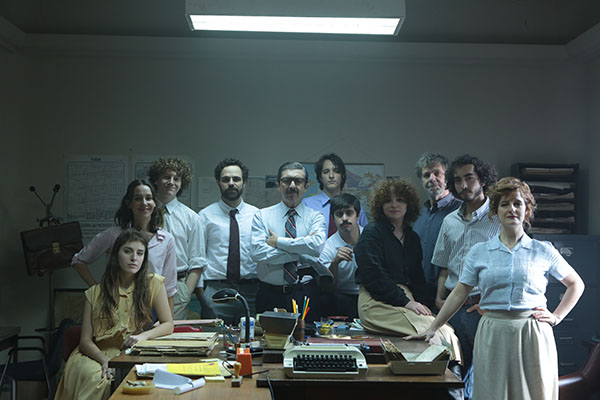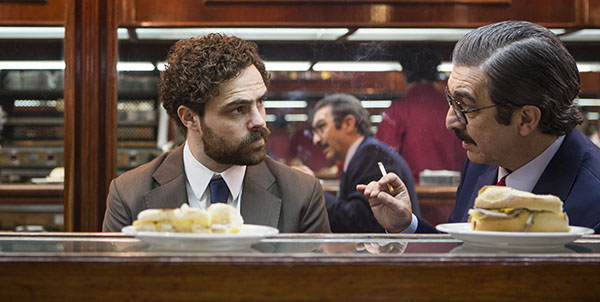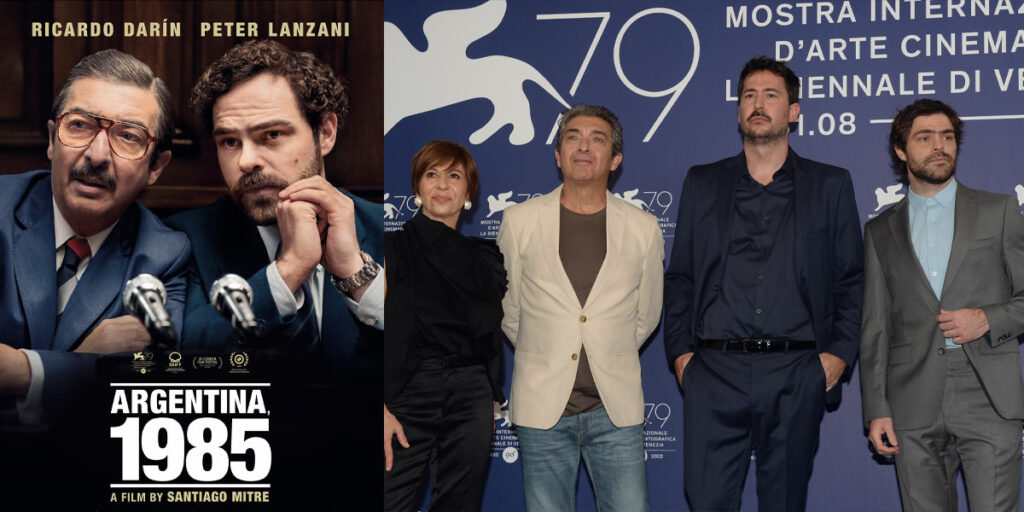In this Venice 2022 interview, we speak with director Santiago Mitre and stars Ricardo Darín and Alejandra Flechner about their film Argentina, 1985.
One of our most anticipated films at the 2022 Venice Film Festival was Santiago Mitre ‘s Argentina, 1985, telling the true story of how public prosecutor Julio Strassera (Ricardo Darín, of The Secret in Their Eyes and Heroic Losers) managed to put together a team to investigate and prosecute the Argentine military Junta who kidnapped, tortured and killed thousands of their own people during the Dirty War of 1976-1983. Of course, getting justice for the desaparecidos and their family is no easy task, and Julio, his wife (Alejandra Flechner’s Silvia) and kids, and his young legal team – led by Luis Moreno Ocampo (Peter Lanzani, of El Clan) – face death threats on a daily basis. But they also show incredible wit and courage, and the film keeps us on our toes as we follow our unlikely heroes use unconventional methods to bring justice to their country, and hope for the future.
But Argentina, 1985 is not just a courtroom drama: it’s also a gripping, often hilarious film with instantly likable characters, and an important retelling of history that brims with humanity. Whether you witnessed the Trial of the Juntas first-hand or you’re just learning about it from the movie, you’re bound to be affected by an incredibly watchable film with a well-crafted script (which Mitre co-wrote with longtime collaborator Mariano Llinás) that blends humour and drama, great performances from its entire cast, and a story that unites people and acts as a warning for the future.
At the 2022 Venice Film Festival ‘s press junket for Argentina, 1985 and ahead of the movie’s Amazon Prime release this fall, we spoke with director Santiago Mitre and stars Ricardo Darín and Alejandra Flechner. Read the interview and find out about the origins of the film, the balance between humour and drama, the need to fight for democracy, and more.

Argentina, 1985 ‘s Origins and the Real Heroes of the Film
Santiago, this is your second film with Ricardo. When did you know you wanted him to play Strassera in Argentina, 1985?
Santiago Mitre: I’ve been admiring Ricardo all my life. I’ve seen him do magnificent work in his films many, many times, and I’ve always wanted to collaborate with him. I was lucky enough to work with him on my previous film [The Summit (La Cordillera), 2017] and, since then, we’ve become very good friends.
Actually, Argentina, 1985 began because I had an idea, and I was having dinner at Ricardo’s house, and I told him about it. I said, “I’m thinking of doing a film about the trial of 85,” and he told me immediately, “I’ll play Strassera.” And so I went back home and started writing it. Ricardo is a producer, too: we did the film together. He was in the film since the first moment, and I discussed every every item on the screen with him. I love him not as just an actor but also as a partner, now that I know him.
Ricardo, what drew you to the film?
Ricardo Darín: I’ve never really liked the idea of playing a character that was based on a real person: I actually refused ten projects in the past for this reason. But Santiago told me the story of the Juicio a las Juntas and that’s what drew me to the film: it felt like an important, impactful story. And when I read the first draft of the script, that’s when I said, “ok, I’m on board.”
Did you know of the events in the movie firsthand?
R. D.: I didn’t experience them directly, but in a way or another we’ve all experienced the dictatorship. I knew of the events because I studied them as part of our country’s history, and there are so many testimonies. But this film goes beyond just suffering with the victims: we wanted to empathise with the pain that many have felt and are still feeling, and try to eradicate it in the best possible way. I know people who lost relatives during the dictatorship, but I didn’t talk to them about it because we trusted that the script could tell this story in a way that could deliver the message. The testimonies in the film are real, and they are the soul of this story: these are the real heroes, those who bore witness in front of the judges while powerful people were still threatening them, even if we had already become a democracy. It must have been so difficult for them, and the stories they told are what really matters.
The Trial of the Juntas and Its Relevance To This Day
Why is the story of the Trial of the Juntas so important for Argentina?
Santiago Mitre: Argentina, as a country, has thought a lot about the dictatorship, but not too much about how the transition to democracy was, and this trial is something very unique and something that we Argentinians feel very proud of, but that not many people remember. I knew something about the trial, but the research for the film was a huge discovery for me. Of course, I knew that Argentina was the first country to have a trial by a civil court to a dictatorship, at a time when so many countries all around were still governed by dictatorships, but I didn’t know how it happened – for example, how Strassera teamed up with these young lawyers who had almost no experience, because nobody trusted that this trial could be done. It was a big discovery for me, and something that made me feel that I could make a film about that. Many people who are older than me lived the dictatorship and remember the trial, but there are many adults who were not born in 85, and bringing this story to cinema is a way to make people realise that we need to fight for democracy every day.
Alejandra Flechner: Argentina is an unpredictable country, and unpredictable moments in history have the potential to become the most interesting moments. A character in the film says that, sometimes, there’s an opening, and something unexpected can happen. Argentina has a great sense of community, and the trial of 1985 made history also thanks to the witnesses, the survivors, their families, the human rights associations, and to all those people that even during the dictatorship demanded and fought for the truth. I think that, even now, there’s a possibility for there to be a sort of synergy in Argentina, because people are taking actions on different levels, and I find that interesting.
What do you remember about the Trial of the Junta, while you were growing up in Argentina?
Alejandra Flechner: In 1985, I was 22-23 years old. It was a moment that had a lot of impact, but the real strength that it had was the fact that it was a milestone, and an international example of a civil court condemning that same country’s military goverment, and taking them to court. But it was also a way for society to look at itself. I lived the dictatorship as a teenager, knowing what was taking place, but it was also difficult to understand what exactly was happening as things were systematically, perfectly planned out so that only the people who were directly involved in these events could know exactly what was going on. Some of us were trying to gather information on what was taking place, but it also seemed like the majority of people didn’t want to know anything.
So, in a way, the trial wasn’t just relevant on an international level, but also inside the Argentinian society. I believe that, ever since that moment, defending democracy has become a priority for the majority of Argentinians. What is absolutely certain is that the defense of human rights was important in 1985 – and even before then, with the Madres de Plaza de Mayo asking for truth and remembrance – and keeps being important now, in 2022.

The Humour in Argentina, 1985
The film is so funny!
Santiago Mitre: It was only yesterday [during the premiere] that I realised the film was very funny! [laughs] I didn’t anticipate that people were going to laugh that much! We knew with Ricardo and the actors that we were going to have a certain “tone,” since the real-life character, loco Strassera, did a lot of crazy things, and that was going to bring some humour. But the reason why we brought it in was mainly to show Strassera’s humanity, and the relationships between the characters, instead of portraying them in a darker way.
It made me feel good to see that people laughed so much. And I understood that, perhaps, the audience needed that laughter to let go a little bit, and compensate emotions. It was a nice surprise: besides the crying, there’s a little bit of humour that audiences can appreciate.
There’s a scene in the film where Julio Strassera, played by Ricardo Darín, pretends to have forgotten the name of Luis Moreno Ocampo, played by Peter Lanzani, and, even afterwards, he keeps getting it wrong. This really says a lot about Strassera’s sense of humour.
Ricardo Darín: Strassera was a man that had a great sense of humour, but it was … ácido, áspero: sort of sour. We were told about so many jokes that he used to tell his team, and we were very interested in this side of his personality. It’s thanks to this that we were able to demistify certain moments in the film, to have a sort of balance between the humour and the seriousness or the story. With Luis Moreno Ocampo, Strassera takes advantage of the fact that, in Latin American countries, so many people have multiple surnames and it’s easy to get confused: what he really wants to express is his lack of acceptance for the new member of the team. But then he realises that this new team member actually has a good idea, and he gets his name right: this is his way of showing him that he accepts him.
What else did you learn about the real Strassera, in terms of the funny things he used to do?
Ricardo Darín: Actually, they did tell us an anecdote – something that happened with his legal team. El tipo had a very strange sense of humor [laughs]! When they started recruiting young people, one day he entered the office holding a toy gun and started shooting! Right away, los chicos went down to the floor, and he told them, “you are not the right people for this trial!” [everyone laughs]
Recent Events in Argentina and the Ongoing Fight for Democracy
Can you talk about the relevance of the film with regards to recent events in Argentina, with the assassination attempt of VP Cristina Fernández?
Alejandra Flechner: It’s absolutely deplorable, and we are shocked, because something like this has never happened in our country before. I’d like to offer one point of view, since we’d need much more time to have a proper conversation about this, and it’s also the point of view of the women, because things are always so much harder and more complicated for us. I think about the mothers and grandmothers who are still looking for their grandchildren, and now this [assassination attempt] happened to a woman as well, in a moment when there is so much absolute hatred in the world. It’s terrible, and it feels like sometimes we move forward and make progress very quickly, but then there are other times when we move backwards.
Santiago Mitre: What happened a few days ago in Argentina was surreal for us, because we thought that was something that would never happen again. And that Strassera’s final sentence, “nunca más,” – no more political violence – would stay true. It was terrible. It’s a callable image that we never wanted to have again. We are afraid, and we realised that the film is more actual than we thought it was: democracy is something that we need to fight for, and to defend, once again. It’s something that is happening not only in Argentina but, sadly, in many other places in the world too.
This interview has been translated into English from Spanish and edited for length and clarity.
Argentina, 1985 premiered at the Venice Film Festival on September 3, 2022 and is now available to watch on Prime Video.

